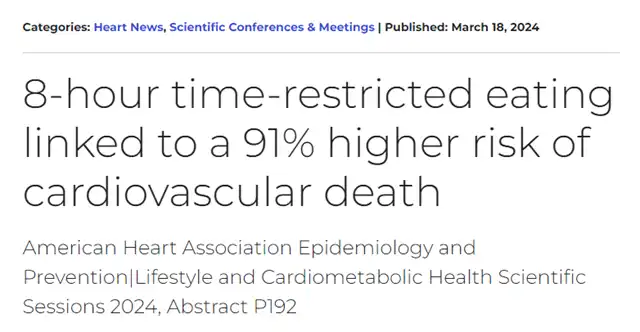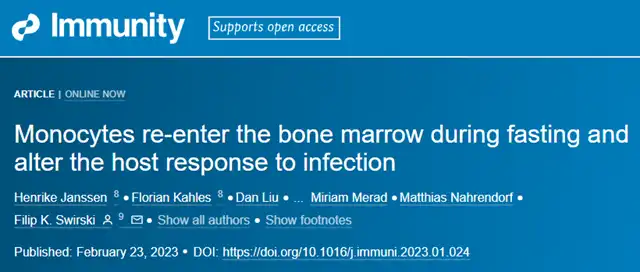Fasting for 16 hours a day may increase the risk of cardiovascular death by 91%
- Normal Liver Cells Found to Promote Cancer Metastasis to the Liver
- Nearly 80% Complete Remission: Breakthrough in ADC Anti-Tumor Treatment
- Vaccination Against Common Diseases May Prevent Dementia!
- New Alzheimer’s Disease (AD) Diagnosis and Staging Criteria
- Breakthrough in Alzheimer’s Disease: New Nasal Spray Halts Cognitive Decline by Targeting Toxic Protein
- Can the Tap Water at the Paris Olympics be Drunk Directly?
Fasting for 16 hours a day may increase the risk of cardiovascular death by 91%
- Should China be held legally responsible for the US’s $18 trillion COVID losses?
- CT Radiation Exposure Linked to Blood Cancer in Children and Adolescents
- FDA has mandated a top-level black box warning for all marketed CAR-T therapies
- Can people with high blood pressure eat peanuts?
- What is the difference between dopamine and dobutamine?
- How long can the patient live after heart stent surgery?
Fasting for 16 hours a day may increase the risk of cardiovascular death by 91%
In recent years, fasting has become a new favorite in the scientific community, proven to aid in weight loss and extend animal lifespans. Indeed, a growing body of research suggests that fasting has many health benefits, improving metabolic health, preventing or delaying age-related diseases, and even slowing tumor growth.
Intermittent fasting is typically divided into three categories: daily time-restricted feeding, where one eats within an 8-hour window and fasts for the remaining 16 hours; the so-called “5:2 intermittent fasting,” where one eats regularly for 5 days and eats minimally for 2 days; and alternate-day fasting. While several studies suggest that fasting has many health benefits, it is unclear what the long-term effects of time-restricted fasting are on health, including the risk of cardiovascular disease death and overall mortality.
On March 18, 2024, researchers from the Shanghai Jiao Tong University School of Medicine and Stanford University presented a new study at the American Heart Association’s Epidemiology and Prevention | Lifestyle and Cardiometabolic Health Scientific Sessions. The study’s findings will be published in the American Heart Association’s journal.
This study analyzed the long-term effects of intermittent fasting. Compared to the typical 12-16 hour eating window, those following a 16+8 fasting regimen had a 91% increased risk of cardiovascular disease death. The risk of cardiovascular death was also increased for those with heart disease or cancer. Additionally, the 16+8 fasting regimen did not reduce the overall risk of death.

In this study, researchers analyzed data from over 20,000 adult participants in the National Health and Nutrition Examination Survey (NHANES), with an average age of 49 and a roughly equal gender ratio. Participants’ dietary patterns were collected through dietary questionnaires, and the long-term effects of the 16+8 time-restricted eating pattern on health were analyzed.
During an average follow-up period of 8 years (up to 17 years), a total of 2797 deaths were recorded, with 840 deaths due to cardiovascular reasons.
The study found that restricting daily eating to an 8-hour window was associated with a higher likelihood of dying from cardiovascular disease. Compared to the typical 12-16 hour eating window, those following a 16+8 fasting regimen had a 91% increased risk of cardiovascular disease death.
Additionally, the risk of cardiovascular death was increased for those with heart disease or cancer. Compared to the typical 12-16 hour eating window, those eating within an 8-10 hour window had a 66% increased risk of dying from heart disease or stroke.
Regarding the overall risk of death, the 16+8 fasting regimen did not reduce the overall risk of death and was not associated with extended lifespan.
Interestingly, for cancer patients, longer daily eating times (more than 16 hours) were associated with lower cancer mortality rates.
The authors noted that they were surprised to find that those following an 8-hour time-restricted diet were more likely to die from cardiovascular disease. While this dietary approach is popular for its potential short-term benefits, the research clearly indicates that shorter eating times do not correlate with longer lifespans. Time-restricted eating may offer short-term benefits but could also have long-term adverse effects.
The researchers added that for patients with heart disease or cancer, understanding the association between an 8-hour eating window and increased risk of cardiovascular death is crucial. The study results encourage more cautious and personalized approaches to dietary recommendations to ensure they align with individual health conditions.
However, the researchers emphasized that while the study found an association between an 8-hour eating window and increased risk of cardiovascular death, this does not mean that time-restricted eating causes cardiovascular death, nor does it imply a causal relationship.
The researchers also highlighted the limitations of these studies, as participants’ dietary patterns were self-reported, which may introduce memory bias, and factors other than eating time and cause of death that could affect health were not included in the analysis.
The authors concluded that more research is needed in the future to explore the biological mechanisms linking time-restricted eating to adverse cardiovascular outcomes.
In summary, this study analyzed the long-term effects of 16+8 fasting on health, and the results suggest that those following a 16+8 fasting regimen may be more likely to die from cardiovascular disease.
It is worth noting that on April 3, 2023, researchers from the Icahn School of Medicine at Mount Sinai and Harvard Medical School published a study titled “Monocytes re-enter the bone marrow during fasting and alter the host response to infection” in the journal Immunity.
The study found that prolonged fasting alters the host’s immune response to bacterial infection, which may be detrimental to infection resistance and increase the risk of heart disease. For the first time, a mouse model study showed that prolonged fasting triggers a stress response in the brain, which negatively affects immune cells.

Links:
- News Article: 8-hour Time-restricted Eating Linked to a 91% Higher Risk of Cardiovascular Death
- Research Paper: Monocytes re-enter the bone marrow during fasting and alter the host response to infection“
Fasting for 16 hours a day may increase the risk of cardiovascular death by 91%
(source:internet, reference only)
Disclaimer of medicaltrend.org
Important Note: The information provided is for informational purposes only and should not be considered as medical advice.



